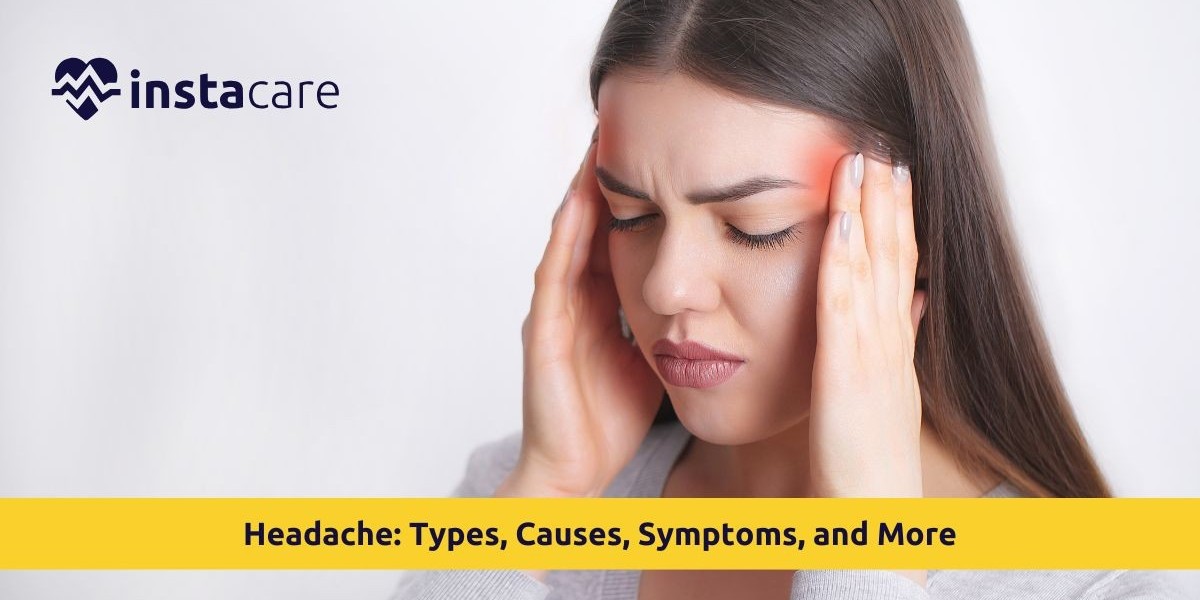Introduction: Understanding Headaches and Why They Matter
We’ve all had a headache at some point—whether it was mild and fleeting or one that made it hard to get out of bed. But headaches aren’t just common annoyances. They can be a sign of deeper issues or chronic conditions that affect your quality of life. Understanding the types, causes, and treatments of headaches can help you manage them better—or even prevent them. In this guide, we’ll walk you through everything you need to know, from the science of why headaches happen to the most effective ways to treat them.
What Is a Headache?
A headache is defined as pain or discomfort in the head, scalp, or neck. It can range from a dull ache to a sharp, throbbing pain and can last for minutes, hours, or even days. Headaches are usually caused by overactive nerves, blood vessels, or muscles in the head and neck region. While some headaches are simply triggered by stress, others can be linked to more serious medical issues like infections, neurological disorders, or trauma.
Different Types of Headaches You Should Know About
There are over 150 types of headaches, but they generally fall into two main categories: primary and secondary headaches. Each type has unique triggers, symptoms, and treatments.
1. Tension Headaches
These are the most common types of headaches. They feel like a constant band-like pressure around the head.
- Symptoms: Mild to moderate pain on both sides of the head, neck stiffness, and scalp tenderness.
- Triggers: Stress, poor posture, eye strain, lack of sleep.
2. Migraine Headaches
Migraines are intense headaches that can be debilitating and last for hours to days.
- Symptoms: Throbbing pain (usually on one side), nausea, vomiting, sensitivity to light and sound, and sometimes visual disturbances (auras).
- Triggers: Hormonal changes, certain foods, dehydration, weather changes, and stress.
3. Cluster Headaches
Less common but extremely painful, cluster headaches occur in cycles or “clusters.”
- Symptoms: Severe burning or piercing pain around one eye, red or teary eye, runny nose on one side.
- Triggers: Alcohol, smoking, high altitudes, and seasonal changes.
4. Sinus Headaches
These occur due to sinus inflammation or infection (sinusitis).
- Symptoms: Deep pain in the forehead, cheekbones, or bridge of the nose, often accompanied by nasal congestion and fever.
- Triggers: Allergies, colds, or sinus infections.
5. Rebound Headaches
These are caused by overusing pain medications.
- Symptoms: Daily or almost-daily headaches, often worse upon waking.
- Triggers: Frequent use of over-the-counter or prescription headache medication.
Common Causes of Headaches
Understanding what triggers a headache can help you avoid future episodes. While causes can vary depending on the headache type, here are some common ones:
- Stress and anxiety
- Lack of sleep or irregular sleep patterns
- Skipping meals
- Dehydration
- Caffeine withdrawal
- Poor posture
- Eye strain from screens
- Alcohol or processed food
- Weather changes or strong smells
- Hormonal changes (especially in women)
In some cases, headaches can be secondary to medical conditions like:
- High blood pressure
- Brain tumor
- Meningitis
- Concussion or trauma
- Stroke
Symptoms to Watch Out For
While most headaches are not life-threatening, some symptoms may indicate a more serious condition. See a doctor immediately if you experience:
- Sudden, severe headache (often described as “the worst ever”)
- Headache after a head injury
- Headache with stiff neck, fever, or confusion
- Visual disturbances, slurred speech, or numbness
- Persistent headache that worsens over time
How Headaches Are Diagnosed
Doctors typically start with a detailed medical history and physical examination. They’ll ask about:
- Your headache pattern and frequency
- Any associated symptoms
- Triggers and lifestyle habits
- Medications or other health conditions
If they suspect a more serious cause, they may order:
- CT Scan or MRI: To rule out tumors or bleeding
- Blood tests: To check for infections or inflammation
- Eye exam: If headaches are linked to visual issues
- Lumbar puncture: If meningitis is suspected
Treatment Options for Headaches
1. Over-the-Counter Medications
- Acetaminophen (Tylenol)
- Ibuprofen (Advil, Motrin)
- Aspirin
These are effective for mild to moderate headaches like tension or sinus headaches.
2. Prescription Medications
- Triptans: For migraines (e.g., sumatriptan)
- Ergots: For severe migraines or cluster headaches
- Preventive medications: Beta-blockers, antidepressants, or anti-seizure drugs
3. Lifestyle Modifications
- Get regular sleep
- Eat balanced meals
- Stay hydrated
- Reduce stress through meditation or yoga
- Limit screen time and take eye breaks
4. Natural Remedies
- Cold or warm compresses
- Essential oils (peppermint or lavender)
- Hydration with electrolyte-rich fluids
- Caffeine (in small doses)
5. Therapies
- Cognitive behavioral therapy (CBT)
- Acupuncture
- Biofeedback
- Chiropractic care or physical therapy
Prevention Tips: How to Avoid Headaches in the First Place
You can significantly reduce the frequency and severity of headaches by:
- Keeping a headache diary to track triggers
- Maintaining a regular routine (sleep, meals, exercise)
- Avoiding known triggers (like certain foods or bright lights)
- Managing stress effectively
- Limiting caffeine and alcohol intake
- Staying physically active
If you’re prone to migraines or chronic headaches, talk to your doctor about preventive medications and long-term care strategies.
When to See a Doctor
Please visit your nearest best neurologist if:
- Occur frequently or interfere with your daily life
- Get progressively worse over time
- Are accompanied by neurological symptoms (vision changes, weakness)
- Happen after an injury or trauma
- Are resistant to over-the-counter medication
Timely medical care can help diagnose any underlying issues and prevent complications.
Conclusion: Know Your Headache, Take Control
Headaches are a part of life—but they shouldn’t control your life. By understanding the different types, causes, and treatment options, you can take charge of your health and live with fewer interruptions. Whether you need lifestyle adjustments, medication, or just a bit more sleep, managing headaches is possible with the right approach. Listen to your body and don’t hesitate to seek help when needed. Because your peace of mind—literally—matters.
FAQs About Headaches
Q1: Can dehydration cause headaches?
Yes. Dehydration is one of the most common and easily fixable causes of headaches. Drink plenty of water, especially in hot weather or after exercise.
Q2: Are headaches a sign of high blood pressure?
They can be. While not always present, high blood pressure can cause headaches, especially if it reaches dangerous levels. Always check your BP if headaches persist.
Q3: What is the difference between a migraine and a regular headache?
A migraine is typically more severe and includes symptoms like nausea, vomiting, and sensitivity to light and sound. It may also come with an “aura” before the pain starts.








